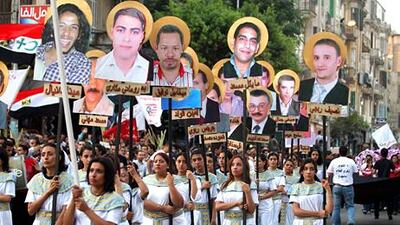CAIRO // Overwhelmed by anxiety and fear, some of Egypt's Coptic Christians now view life in the mainly Muslim nation as the worst in memory.
Islamists of all shades have risen to positions of power in Egypt since the president, Hosni Mubarak, was toppled last year.
The Muslim Brotherhood provided the nation with its first freely elected president, while its political party secured more parliamentary seats than any other party.
As the Brotherhood seeks to project an image of moderation and flexibility, the ultraconservative Salafis are tirelessly advocating a strict implementation of Sharia that could reduce Christians to the status of second-class citizens by barring them from certain jobs or forcing them to pay a special tax historically known as "jizyah".
Christian activist Beshawi Rifaat believes the plight of his community has worsened since Mohammed Morsi took office on June 30 and released scores of militants, with many of them speaking publicly against Christians.
"The persecution of the Christians comes from individuals and non-governmental groups and it is not countered by any government action," said Mr Rifaat. "I take its silence to mean approval."
Egypt's Christians, thought to account for about one in 10 of the nation's estimated 85-million people, led a mostly peaceful life under Mubarak's 29-year rule. They enjoyed the protection of a regime that had reserved its worst for Islamists, particularly militants with ideological convictions that called for Christians to be disenfranchised.
Since the fall of Mubarak nearly two years ago, however, they have suffered a wave of attacks on their churches, homes and businesses.
"The culture has changed," said Shadi Rasmy, a Christian civil engineer who lives in Cairo. "Any problem, no matter how small, that has anything to do with Christians is quickly turned into a cause for jihad.
"I don't see the future to be any better. There is nothing I see that suggests it will be."
The deaths of 26 Christians during clashes with army troops on October 9 last year has served as a grim watershed.
They were killed during a protest by hundreds of Christians angry against a string of attacks on churches and denouncing the military for failing to protect them. Soldiers attacked the crowd, crushing some protesters to death with military vehicles and shooting others.
The anniversary last week prompted several rights groups to threaten to take the case to the International Criminal Court in The Hague if the authorities failed to prosecute those responsible.
But it is the uproar over the anti-Islam film Innocence of Muslims, made by a US-based Egyptian Christian, that has deepened the predicament of Christians in Egypt.
Last month's wave of deadly, anti-film protests in Egypt, and across the Muslim world, has revived a debate in the West over freedom of speech, with many there condemning the film but defending the rights of its makers and deploring the violent protests.
In Egypt, the uproar led to the revival of calls for a global law that bans insults against religion, something that the West is unlikely to consider.
The protests have also prompted Islamists to resort to legal channels against Christians, using a vaguely defined charge of "contempt for religion" to bring them before the courts. There have been 17 court cases involving that charge since January last year, about a third of them in recent weeks.
Anyone convicted of showing contempt for religion can face up to five years in jail.
Alber Saber, a Christian, was the first to be charged since the film protests began. He is on trial for posting material on his Facebook page deemed offensive to religion. His neighbours jubilantly greeted his arrest, gathering in their hundreds outside his house while the police searched his apartment.
Last week, two Christian schoolboys were detained by police after a Salafist alleged they had urinated on a copy of the Quran in a village in Beni Suef province. Anticipating violence as angry residents gathered outside the police station, security forces surrounded the village and the boys were taken to a juvenile detention facility. They were released on Thursday.
A Coptic schoolteacher, also from a province south of Cairo, was questioned by police last week and detained overnight after her students accused her of insulting the prophet in class. The teacher was released, but the charge against her has not been dropped.
During the 18-day uprising that toppled Mubarak's regime, Muslims and Christians prayed together in Tahrir Square.
But Mr Morsi appears to have nothing new to offer Muslim-Christian harmony.
He has, for example, been repeating the old Mubarak-era saying that there is no such thing in Egypt as a majority and a minority, a stand that has long been criticised by rights groups as an attempt to sweep a serious problem under the rug.
He has also failed to deliver on his election campaign promise to name a Christian as one of his vice presidents. His Cabinet includes a single Christian, a woman and his only Christian adviser has quit the panel tasked with drafting a new constitution in protest over Islamist domination of the process.

